We have asked Dan Call, a frequent reviewer of Mormon literature on Goodreads, to put together some of his reviews for a post. We hope hear more from Call in the future. Call starts by answering the question, “What got you interested in reading Mormon literary works?
I’m not entirely sure at what point you could say I began reading Mormon Literature. In my teens I devoured the encyclopedic, final-say-on-the-matter tomes my parents had on their shelves, tempted by the authority which they promised to bestow. Technically this counts as Mormon Literature, but the cosmology I constructed using these books went unchallenged until my college years. Unwilling and unequipped to resolve the cognitive dissonance of my own understanding with what I was learning through studying cultural anthropology, revisionist history, modern philosophy, and constructivist pedagogy, I committed the error of compartmentalizing my worlds, supposing that this solved the conflict.
While it would make for a great story to say that that a life crisis compelled me to have to reconcile my faith with my studies, it wasn’t like that at all. At some point a friend simply loaned me a copy of Ender’s Game, a neighbor kept quoting Terryl Givens until I decided to find out what all the fuss was about, an algorithm on my phone suggested I listen to a podcaster who interviewed Adam Miller. Why not experiment upon these words? Each time I dive in, I find a Mormonism that heals the divide I artificially and unnecessarily set up all those years ago. Some of these books, by exploring the past, show me new ways of understanding my relation to history. Some help me make sense of where I stand now, or prepare me for situations I may some day stand in. Some confer empathy and love where I previously only had ignorance and fear. Some even joyfully tell me fantastical, engrossing tales that could only have been told by a Mormon.
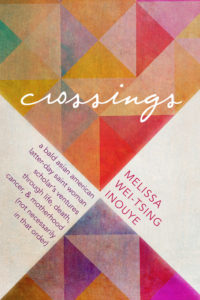 Crossings: A Bald Asian American Latter-Day Saint Woman Scholar’s Ventures Through Life, Death, Cancer, and Motherhood (Not Necessarily in That Order). By Melissa Wei-Tsing Inouye. 5 stars. July 15, 2019.
Crossings: A Bald Asian American Latter-Day Saint Woman Scholar’s Ventures Through Life, Death, Cancer, and Motherhood (Not Necessarily in That Order). By Melissa Wei-Tsing Inouye. 5 stars. July 15, 2019.
Inouye writes beautifully, communicating grand ideas with surprising ease and humility. This collection of writings, ranging from yearly newsletters, to letters to her children, to theological arguments, to college lectures, likewise are addressed to a spectrum of readers: children, family, friends, students, colleagues, strangers, would-be adversaries, those wavering in their faith. With such a variety, I would have expected little coherence, but the common element (and most compelling reason for me to award this pearl of great price with the highest rating I can give) is that it is evident that over the time and spaces that she composed this book, she treats all of her readers with great respect and love, as if they were all equals. She doesn’t “write down” to her children, doesn’t wag her finger at critics, nor does she aim to bedazzle the intelligentsia. All throughout, I felt that she wrote from a union of heart and mind – no easy task, but something that I aspire to in my practice.
Thank you, Melissa, for this treasure.
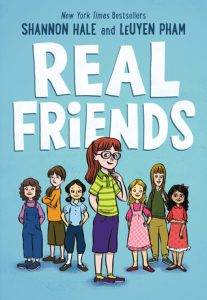 Real Friends. Shannon Hale. 5 stars. July 6, 2019.
Real Friends. Shannon Hale. 5 stars. July 6, 2019.
Hale’s childhood experiences with friendship are relived and beautifully illustrated in this volume – a favorite of my kids, which they persuaded me to pick up. Having such an excellent yet accessible author take up the themes of forming friendships, dealing with relational conflicts, bullies, sibling rivalries, social dynamics, and mental conditions is a blessing for young readers. She treats even the cheesiest or most challenging of her memories with wonder and trembling, never devolves into winky nostalgia or ham fisted moralizing.
Really a great read, regardless of your age!
Grace Is Not God’s Backup Plan: An Urgent Paraphrase of Paul’s Letter to the Romans. By Adam S. Miller. 4 stars. May 16, 2019.
Miller wisely tells you in the introduction (as well as in the title, although I overlooked that somehow) to this text exactly what you he attempted: instead of a newer, clearer translation, he attempts a paraphrase, which is what I get almost every time someone attempts to quote scripture to me, anyway.
I have attempted to read Romans several times, and in several different translations, and the larger meaning of what Paul is trying to communicate has always eluded me, but with this book I feel like I have a clearer idea than ever.
Miller makes a few word choices that really add to the flavor of this text, breathing new life into concepts that I was convinced I completely understood. My favorite example: he replaces the “Jew and Gentile” binary with “insider and outsider.” I can’t stop seeing the implications of this reformulation at every level in my worship and discipleship.
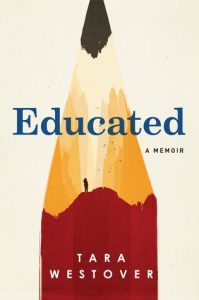 Educated: A Memoir by Tara Westover. 4 stars, March 11, 2019.
Educated: A Memoir by Tara Westover. 4 stars, March 11, 2019.
This is an important, timely book. Westover’s story touched me deeply, provoking me to reflect on several of my own positions, as a straight male who reaps the benefits of patriarchy, as an active member of the same church in which she was raised, as a scholar and professional who confronts imposter syndrome on a regular basis.
Her writing is vivid, easy to engage with, but also packed with heft. Between the abuse of one family member, the negligence of another, and the shunning of yet another, I found myself replaying in my mind the closing catharsis from the film “Smoke Signals,” where Thomas asks, “How shall we forgive our fathers? …If we forgive our fathers, what is left?”
Although I sympathize with her growing away from our faith, I also feel a great sense of loss that Westover no longer identifies with Mormonism. She comes across as someone that we could use more of right now.
So much of her story echoes that of other archetypes in the “evolving into selfhood” vein of memoir writing. It probably wouldn’t fit in this text, but I hope that future editions contain a forward which does some justice to the strong parallels between the author’s story and that of Nephi- a Book of Mormon prophet of Mosaic proportions who likewise lived with a preachy father, a weary, miracle-working mother, siblings ranging from saintly to maniacally abusive, a flight from a failing world, abandonment of the inheritance, and a great deal of education through both study and trials.
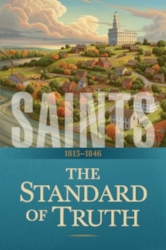 Saints: The Standard of Truth (Saints, #1). The Church of Jesus Christ of Latter-day Saints. 5 stars. Oct. 20, 2018.
Saints: The Standard of Truth (Saints, #1). The Church of Jesus Christ of Latter-day Saints. 5 stars. Oct. 20, 2018.
Full disclosure: I am a practicing and fully dedicated member of the Church of Jesus Christ of Latter-day Saints, and I fully acknowledge the bias through which my reading of this text is filtered (and may consequently be scrutinized by others).
With that out of the way, this text is a well crafted history of the church, as I have been hoping to see for some time. It melds scholarship with discipleship in a way which I have craved for decades. The long-standing narrative upon which I was raised is coupled with nuance and details that shed light on episodes which have usually been passed over in uncomfortable silence: what drove Cowdery to leave the church? Why do we not hear much mention of some of Joseph’s siblings? What role did the seer stone play in Joseph’s gift for translation? This narrative is woven from multiple voices, and neither shies away from nor attempts to resolve with dogmatic finality the tough questions that are raised therein. This for me is the great beauty of “Saints: volume 1”: as an official church publication, it suggests a sense of both acceptance of our beautiful, messy humanity and faith in God’s foresight.
Fuller disclosure: I have always felt as though a large part of me is on the outside of the church, slightly through the comments and actions of a calloused few, but more so because this is the view with which God had blessed me. I since before I was baptized, I’ve been gifted with a desire to understand through the perspective of the marginalized, to de-other the other, if you will. This volume, the first of four, satisfied my love for this kind of storytelling, weaving in the voices of women, freed blacks, Native Americans, mobsters, journalists, bystanders, scholars, and apostates. This only hints that more is to come, and I look forward in eager anticipation.
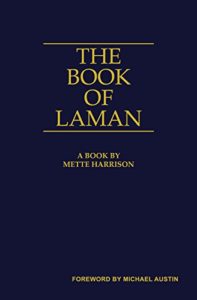 The Book of Laman. By Mette Ivie Harrison. 4 stars. Dec. 31, 2018.
The Book of Laman. By Mette Ivie Harrison. 4 stars. Dec. 31, 2018.
Definitely not trying to be an accurate representation of what Laman would have experienced. Rather, this colorful and thoughtful tale explores the anguish and doubts of a son of God seemingly destined to live in the shadow of a prodigiously blessed sibling. The constant rebukes, the less than righteous habits, the misunderstood acts, the easy to spit sins… all of these add up to an emotionally charged story. There were a few unexplored facets to Laman that I felt the author should have included- even alluded to in earlier chapters, and just never followed up on.
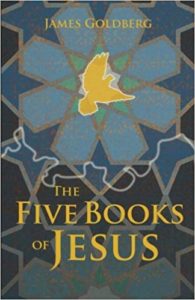 The Five Books of Jesus. By James Goldberg. 5 stars. May 19, 2018.
The Five Books of Jesus. By James Goldberg. 5 stars. May 19, 2018.
Absolutely riveting. I intentionally slowed down my reading of the book so as to draw it out and savor each episode as much as possible. I’m a huge fan of how Goldberg envisions the inner workings of each disciple’s soul- Andrew, Peter, Judas in particular.
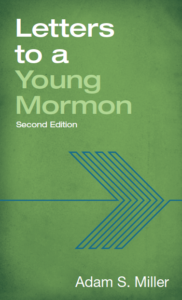 Letters to a Young Mormon. By Adam S. Miller. 5 stars. Nov. 20, 2017.
Letters to a Young Mormon. By Adam S. Miller. 5 stars. Nov. 20, 2017.
Though the title might dissuade older readers from jumping in, I can’t emphasize this enough: this book is for all ages. Miller’s ideas are accessible and thought provoking. I wish that I’d had a copy of this when I was younger. His letters on Faith, History, and Sex are my favorites. What works best in each letter is that he approaches the stated topic from a fresh perspective, eschewing hollow platitudes, cool skepticism, or appeals to mysticism. Miller’s counsels feel “lived-in”, earned through meditation and years of trial.
Joseph Smith: Rough Stone Rolling. By Richard S. Bushman. 5 stars. Dec. 18, 2017.
I can’t say enough good about this book. Bushman models meticulous, painstaking attention to detail, infusing it with the perfect balance of historical skepticism and respect for the people in this story (not just JSjr). Add in a dash of carefully weighed and reasoned imagination to help fill in some of the gaps, and you get a life story that finally does justice to Joseph Smith.
The author loves the subject, is a practicing member of the Mormon tradition (as am I), but this is not hagiography. There are no flimsy attempts to excuse or gloss over the prophet’s shortcomings or failures. Conversely, the remarkable achievements of Joseph Smith, Jr. are not derisively brushed aside. Instead, readers are challenged to grapple with the hard questions that his life asks. What we are left with is a portrait of a beautifully flawed man who took Christianity in new directions, changed the lives of thousands, and left a stunning body of work in a relatively short time.
People tend to see what they want in this text. Some emerge from a careful reading with supercharged faith, others cite it as an inflection point in their journeys out of Mormonism, and still others find all all the material they need to confirm their suspicions of Smith the charlatan. To me, the array of possible interpretations of this text attest to its importance and influence, while definitively confirming Smith’s place among towering figures in American and religious history.
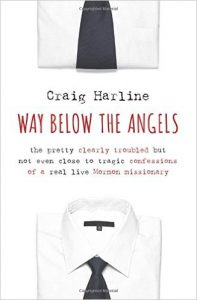 Way Below the Angels: The Pretty Clearly Troubled But Not Even Close to Tragic Confessions of a Real Live Mormon Missionary. By Craig Harline. 4 stars. March 12, 2016.
Way Below the Angels: The Pretty Clearly Troubled But Not Even Close to Tragic Confessions of a Real Live Mormon Missionary. By Craig Harline. 4 stars. March 12, 2016.
Harline’s stream of consciousness take on the mission experience is hilarious, unsettling, often touching, and above all honest and unfiltered. The whole book reads easily, even if you are unversed in LDS missionary lore. I especially appreciate the epilogue, which gave me a new lens of looking at my own mission in Chile.

.
Thanks for the intro. I think I might assign it if I’m teaching Mormon lit again.